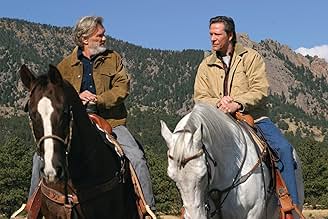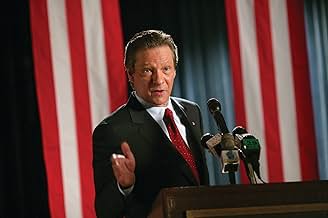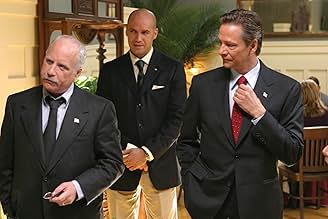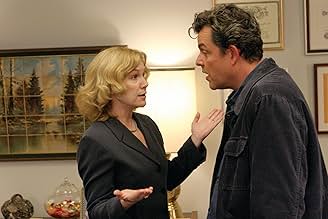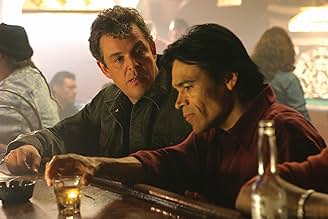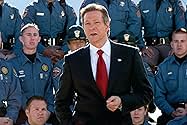Silver City
- 2004
- Tous publics
- 2h 8min
NOTE IMDb
6,0/10
4,3 k
MA NOTE
La découverte d'un cadavre menace de faire échouer la campagne maladroite d'un politicien local pour le poste de gouverneur du Colorado.La découverte d'un cadavre menace de faire échouer la campagne maladroite d'un politicien local pour le poste de gouverneur du Colorado.La découverte d'un cadavre menace de faire échouer la campagne maladroite d'un politicien local pour le poste de gouverneur du Colorado.
- Réalisation
- Scénario
- Casting principal
- Récompenses
- 1 victoire et 1 nomination au total
Avis à la une
I was disappointed by this. Oh, it is great fun goofing on any politician, the more smarmy and sanctimonious the better. But I can get political goofs by the dump truck load from elsewhere. What I expected was something as gently incisive as, say, "Doonesbury," but with the cinematic skills we know Sayles has. Something as gentle and sharp as "tanner on Tanner."
We have three threads here. The first is the depiction of the system, the handlers and supporters that "make" a president. We all know how it is; many politicians admit it and nearly all journalists report on it. There isn't a shred of newness in this thread, and surely not out of Dreyfuss.
There's a second component having to do with the story that wraps the thing. Now here is where I expected some art. What we end up with a single big corporation as the bad guy, no, beyond that a single corporate man. Then we see how his misdeeds unravel a bit. Sure, we have payoffs, bribery, rampant disregard for the environment and a cover-up.
But see. The thing to make fun of is how some reduce big complex issues to simple narratives. How they take a million threads of a complex tapestry with inscrutable hues and patterns and reduce it to a paper towel with flag patterns. So why do the same thing when satirizing them? Why? It isn't as if there aren't people in the film world incapable of doing this? Or was it just a rush job?
Most people let all that slip because Chris Cooper's version is too delicious. Here's the problem with this: its not disturbing enough. The thing with the target's speech is how he needs to have his mouth work, but his mind cannot produce the coherent thought fast enough, so it looks for stored phrases and tries to evaluate them for appropriateness on the fly. This gives both odd pauses and sometimes goofy leaps in concepts and metaphors.
Listen to Cooper and pay attention to the leaps. Both are fabricated for dramatic effect. The pauses are regular. They're not even, but they have multiples: pause, twice as long three times as long. And they have a rhythm that if you listen makes a sort of sense.
Now look at the linguistic leaps. They have the same patterns, regular semantic distances. That's because we as viewers have to be in on the joke. We know he will jump and precisely how far. We just don't know the direction. See, humor is in the unexpected and in order for it to work, you need to set expectations.
Now, dear reader, listen to the target. He is not creating something as art, he is just living. What you will find is a well-studied artifact of a man whose cognitive centers have been damaged by cocaine saturation. There is no regularity. Pauses are random. The semantic distances are random. That's the whole point. This is what you find in substance abusers. Always. It is not dumbness but drug damage.
Oddly the National Institutes of Health had a great research program on this because all sorts of conditions like Alzheimers can be diagnosed by measuring these speech effects. But once the link was make to cocaine users, the program was terminated. Now that would make a good movie, Huh?
Ted's Evaluation -- 2 of 3: Has some interesting elements.
We have three threads here. The first is the depiction of the system, the handlers and supporters that "make" a president. We all know how it is; many politicians admit it and nearly all journalists report on it. There isn't a shred of newness in this thread, and surely not out of Dreyfuss.
There's a second component having to do with the story that wraps the thing. Now here is where I expected some art. What we end up with a single big corporation as the bad guy, no, beyond that a single corporate man. Then we see how his misdeeds unravel a bit. Sure, we have payoffs, bribery, rampant disregard for the environment and a cover-up.
But see. The thing to make fun of is how some reduce big complex issues to simple narratives. How they take a million threads of a complex tapestry with inscrutable hues and patterns and reduce it to a paper towel with flag patterns. So why do the same thing when satirizing them? Why? It isn't as if there aren't people in the film world incapable of doing this? Or was it just a rush job?
Most people let all that slip because Chris Cooper's version is too delicious. Here's the problem with this: its not disturbing enough. The thing with the target's speech is how he needs to have his mouth work, but his mind cannot produce the coherent thought fast enough, so it looks for stored phrases and tries to evaluate them for appropriateness on the fly. This gives both odd pauses and sometimes goofy leaps in concepts and metaphors.
Listen to Cooper and pay attention to the leaps. Both are fabricated for dramatic effect. The pauses are regular. They're not even, but they have multiples: pause, twice as long three times as long. And they have a rhythm that if you listen makes a sort of sense.
Now look at the linguistic leaps. They have the same patterns, regular semantic distances. That's because we as viewers have to be in on the joke. We know he will jump and precisely how far. We just don't know the direction. See, humor is in the unexpected and in order for it to work, you need to set expectations.
Now, dear reader, listen to the target. He is not creating something as art, he is just living. What you will find is a well-studied artifact of a man whose cognitive centers have been damaged by cocaine saturation. There is no regularity. Pauses are random. The semantic distances are random. That's the whole point. This is what you find in substance abusers. Always. It is not dumbness but drug damage.
Oddly the National Institutes of Health had a great research program on this because all sorts of conditions like Alzheimers can be diagnosed by measuring these speech effects. But once the link was make to cocaine users, the program was terminated. Now that would make a good movie, Huh?
Ted's Evaluation -- 2 of 3: Has some interesting elements.
Pretty scary film, with its only slightly veiled alignment with Bush's environmental and immigration policies(contradiction in terms to be sure!), this uneven and fragmented film missed the mark in great film-making but hit it somewhat in its frightening depiction of the real power behind the powers that appear to be in charge in today's politics.
Cris Cooper's character's dysfunction with the English language was so very similar to Bush's and really appeared pathetic in a man running for governor, but to his credit he didn't say "nucular" one time but did have that same unfortunate impromptu speaking difficulty that Bush has when speaking off the cuff. Really embarrassing and hard to watch, just like with Bush.
Kris Kristofferson's crusty, empire-building, power-mad, money-grubbing, Sagebrush-Rebellion character scared the hell out of me in the same way Dick Cheney does, as did R. Dreyfuss' Karl Rove-like character. Both were excellent as the roles fit them well. Wayyyyyy creepy both, but even more scary to know that real people exist that are just exactly that way and are running our country!!!
The Huston family entry in this film was the loser protagonist, but a weak choice for the leading role due to his too-laid-back style and little boy, disingenuous big smile, plus his family's obvious star-making push behind him. "Let's get the boy a job" shouldn't be the reason for casting movie leads. A more bulldogged, but younger James Woods or Richard Dreyfus-type lead would have been much more credible in the role, and probably would have saved the film. Darryl Hannah was very good in her small role as the slutty, trust-fund sister of the candidate, uselessly taking up space in life but apparently giving lots of men good times in the sack through the years.(On 2nd thought, maybe not so useless after all.)
Overall, this film made me sad and uncomfortable. Sad to know that it characterized so well the political attitudes in the American presidential office today, the very one that will make all of us suffer greatly until it is finally unseated. But, also sad that the film was not put together a bit better with the good actors and story it had. Then, it could have been as effective and as good as "Wag The Dog".
Cris Cooper's character's dysfunction with the English language was so very similar to Bush's and really appeared pathetic in a man running for governor, but to his credit he didn't say "nucular" one time but did have that same unfortunate impromptu speaking difficulty that Bush has when speaking off the cuff. Really embarrassing and hard to watch, just like with Bush.
Kris Kristofferson's crusty, empire-building, power-mad, money-grubbing, Sagebrush-Rebellion character scared the hell out of me in the same way Dick Cheney does, as did R. Dreyfuss' Karl Rove-like character. Both were excellent as the roles fit them well. Wayyyyyy creepy both, but even more scary to know that real people exist that are just exactly that way and are running our country!!!
The Huston family entry in this film was the loser protagonist, but a weak choice for the leading role due to his too-laid-back style and little boy, disingenuous big smile, plus his family's obvious star-making push behind him. "Let's get the boy a job" shouldn't be the reason for casting movie leads. A more bulldogged, but younger James Woods or Richard Dreyfus-type lead would have been much more credible in the role, and probably would have saved the film. Darryl Hannah was very good in her small role as the slutty, trust-fund sister of the candidate, uselessly taking up space in life but apparently giving lots of men good times in the sack through the years.(On 2nd thought, maybe not so useless after all.)
Overall, this film made me sad and uncomfortable. Sad to know that it characterized so well the political attitudes in the American presidential office today, the very one that will make all of us suffer greatly until it is finally unseated. But, also sad that the film was not put together a bit better with the good actors and story it had. Then, it could have been as effective and as good as "Wag The Dog".
John Sayles repeats himself in "Silver City," borrowing very heavy-handedly from his much more effective takes on local politics and the environment that spawns it, from his "City of Hope" (urban NJ), "Lone Star" (Texas)--which also featured Kris Kristofferson in a not dissimilar role-- and "Sunshine State" (Florida), though now he's taking on Colorado.
Other actors also seem to be present for their resonance from other features, Michael Murphy from "Tanner 88," Daryl Hannah almost as crazy as she was in "Kill Bill, Volume 2," and Richard Dreyfuss channeling Duddy Kravitz as a campaign manager.
While Chris Cooper is very effective in capturing a George W. Bush-type politician from a family dynasty, Danny Huston switches confusingly from cynical ex-journalist/investigator to naif as he uncovers a scandal with ever-widening yet encircling entanglements of class, ethnicity, media, real estate, wildlife, etc. etc.
While the satire is scarily amusing, the final scene of this overlong film is literally overkill.
Sayles as usual carefully picks the songs on the soundtrack, here there's frequent Cowboy Junkies tracks.
Other actors also seem to be present for their resonance from other features, Michael Murphy from "Tanner 88," Daryl Hannah almost as crazy as she was in "Kill Bill, Volume 2," and Richard Dreyfuss channeling Duddy Kravitz as a campaign manager.
While Chris Cooper is very effective in capturing a George W. Bush-type politician from a family dynasty, Danny Huston switches confusingly from cynical ex-journalist/investigator to naif as he uncovers a scandal with ever-widening yet encircling entanglements of class, ethnicity, media, real estate, wildlife, etc. etc.
While the satire is scarily amusing, the final scene of this overlong film is literally overkill.
Sayles as usual carefully picks the songs on the soundtrack, here there's frequent Cowboy Junkies tracks.
You'll never look at "W" again without thinking of Dickie Pilager! Nice piece of political satire and all too true. Well shot...well acted... and well directed. The characters are slightly "comic bookish" but consider their real life counterparts.
Be sure to look at the "Additional features" on the DVD. It contains some very pointed social commentary from some very concerned and talented individuals. This movie is probably more important now that we have had the election outcome of 2004.
The Haskell Wexler cinematography is really excellent. Be sure to notice the backgrounds when he is interviewed!
Be sure to look at the "Additional features" on the DVD. It contains some very pointed social commentary from some very concerned and talented individuals. This movie is probably more important now that we have had the election outcome of 2004.
The Haskell Wexler cinematography is really excellent. Be sure to notice the backgrounds when he is interviewed!
What film depicts corrupt politicians and businessmen controlling a vast local resource but enduring a sometimes-hapless yet attractive detective investigating a murder involving those community leaders? If you said 'Chinatown,' you'd be correct; if you said 'Silver City,' you'd also be correct. There are other similarities such as both have stars with last names Huston, and justice is long coming. Beyond that, there is no qualitative similarity: Roman Polanski's 'Chinatown' is a classic; John Sayles' 'Silver City' is a contemporary curiosity.
'Contemporary' because the liberal Sayles writes and directs about a political campaign for the governorship of Colorado that barely disguises its protagonists as George Bush (Chris Cooper) and Karl Rove (Richard Dreyfuss) knockoffs. Cooper's candidate has halting, incomplete, and scripted sentences, undoubtedly the speech patterns of Bush. The manipulative and effective machinations of Dreyfuss's operative are patently those of the infamous Bush campaign mastermind.
The story and dialogue are undistinguished, as if they count on the audience to be mesmerized by the broad parallels to the 2004 campaign. (See 'Primary Colors' for wit and grit about the Clinton campaign, starring John Travolta.) Although Danny Huston (son of John and brother of Angelica) is a lesser Jack Nicholson, his easy-going persona works well for a detective who constantly gets himself into trouble rather than his clients out of it.
The comparison to Michael Moore's documentary 'Fahrenheit 911' is inevitable. The heavy-handedness of 'Silver' makes Moore's work look almost subtle, yet Sayles must be praised for his dissenting voice in parlous times for free speech. Sayles is more successful in weaving the intricate patterns of corruption in 'City of Hope'; here he seems more like Moore in an overt attempt to topple a sitting president. Sayles's 'Lone Star' is more believable, and that's about incest.
John, Viscount Morley in 'Rousseau' wrote, 'Those who would treat politics and morality apart will never understand the one or the other.'
These filmmakers understand both in varying degrees of success.
'Contemporary' because the liberal Sayles writes and directs about a political campaign for the governorship of Colorado that barely disguises its protagonists as George Bush (Chris Cooper) and Karl Rove (Richard Dreyfuss) knockoffs. Cooper's candidate has halting, incomplete, and scripted sentences, undoubtedly the speech patterns of Bush. The manipulative and effective machinations of Dreyfuss's operative are patently those of the infamous Bush campaign mastermind.
The story and dialogue are undistinguished, as if they count on the audience to be mesmerized by the broad parallels to the 2004 campaign. (See 'Primary Colors' for wit and grit about the Clinton campaign, starring John Travolta.) Although Danny Huston (son of John and brother of Angelica) is a lesser Jack Nicholson, his easy-going persona works well for a detective who constantly gets himself into trouble rather than his clients out of it.
The comparison to Michael Moore's documentary 'Fahrenheit 911' is inevitable. The heavy-handedness of 'Silver' makes Moore's work look almost subtle, yet Sayles must be praised for his dissenting voice in parlous times for free speech. Sayles is more successful in weaving the intricate patterns of corruption in 'City of Hope'; here he seems more like Moore in an overt attempt to topple a sitting president. Sayles's 'Lone Star' is more believable, and that's about incest.
John, Viscount Morley in 'Rousseau' wrote, 'Those who would treat politics and morality apart will never understand the one or the other.'
These filmmakers understand both in varying degrees of success.
Le saviez-vous
- AnecdotesThe Bentel company logo is a direct copy from Bechtel Corporation which is a real American defense contractor.
- GaffesWhen Danny is splashing in the mine, the type of flashlight he is holding changes several times.
- ConnexionsReferenced in Tell Them Who You Are (2004)
- Bandes originalesMining for Gold
Written by Philip Thomas and James Gordon
Performed by Cowboy Junkies
Courtesy of BMG Music Canada Inc.
Under license from BMG Film & TV Music
Meilleurs choix
Connectez-vous pour évaluer et suivre la liste de favoris afin de recevoir des recommandations personnalisées
- How long is Silver City?Alimenté par Alexa
Détails
Box-office
- Budget
- 5 000 000 $US (estimé)
- Montant brut aux États-Unis et au Canada
- 1 020 656 $US
- Week-end de sortie aux États-Unis et au Canada
- 337 484 $US
- 19 sept. 2004
- Montant brut mondial
- 1 384 395 $US
- Durée
- 2h 8min(128 min)
- Couleur
- Mixage
- Rapport de forme
- 1.85 : 1
Contribuer à cette page
Suggérer une modification ou ajouter du contenu manquant



